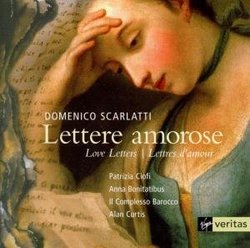| All Artists: Domenico Scarlatti, Il Complesso Barocco, Alan Curtis, Anna Bonitatibus, Patrizia Ciofi Title: Domenico Scarlatti: Lettere amorose Members Wishing: 0 Total Copies: 0 Label: Virgin / Angel Records Release Date: 8/5/2003 Album Type: Import Genres: Pop, Classical Styles: Vocal Pop, Opera & Classical Vocal, Chamber Music, Forms & Genres, Sonatas, Theatrical, Incidental & Program Music, Historical Periods, Baroque (c.1600-1750), Classical (c.1770-1830) Number of Discs: 1 SwapaCD Credits: 1 UPC: 724354554629 |
Search - Domenico Scarlatti, Il Complesso Barocco, Alan Curtis :: Domenico Scarlatti: Lettere amorose
 | Domenico Scarlatti, Il Complesso Barocco, Alan Curtis Domenico Scarlatti: Lettere amorose Genres: Pop, Classical
|
Larger Image |
CD Details |
CD ReviewsFearless! Excessive! Expressive! Giordano Bruno | Wherever I am, I am. | 01/25/2008 (5 out of 5 stars) "Scholar turned performer, Alan Curtis abandoned his successful career in the music department of UC Berkeley to found the ensemble Il Complesso Barocco. There's nothing academic about Il Complesso's performances or recordings, however, as this CD of Domenico Scarlatti's "love letters" amply demonstrates. Curtis is as little fearful of bold excesses as was Scarlatti himself. If these "High Baroque" solo cantatas remind you of the flamboyant sculptures by Giacomo Bernini in Roman churches, I'm sure both Al and Dom would be thrilled.
The first cantata - Piangete occhi dolenti (Weep, sad eyes) - is surely the most expressive of the "Lettere" on the disk. Soprano Patrizia Ciofi uses all the resources of her operatic technique, including the harsh and strident as well as the luscious and supple, to portray the hysterical anguish of unrequited love. She's persuasive, Patrizia. I have no idea what she looks like, but I "hear" a beautiful haughty woman at her wit's end and needing my particular comforting. The strings of Il Complesso Barocco are not averse to risk-taking, either. Led by Marino Lagomarsino, they play this cantata with absolutely no vibrato, braving the dissonances of the part writing, producing an almost achingly plangent sound. That this effect is deliberate is proven by the quite different ensemble playing of the other cantatas on the disk. Mezzo-soprano Anna Bonitibus relies more on the richness of her voice to make her "love letter" - Tinte a note di sangue (Flecked with blood) - expressive. She's less willing to bend pitches for dramatic effect than Ciofi, but with the help of very bold continuo and elegant instrumental counterpoint, Bonitatibus also conveys a world of emotion. This is not music for those seeking serenity or consolation; this is passion in your ears. The final short tracks on the CD are duets extracted from Scarlatti operas. The duet from "Tolomeo et Alessandro" is perhaps the loveliest piece of music per se, the least tormented anyway, on the disk. It reminds me of the incredibly lovely duets by Claudio Monteverdi on the CD Zefiro Torna, also by Il Complesso Barocco, one of my all-time favorites. In the end, I suppose Monteverdi is more 'music to my ears' than Scarlatti, but Lettere Amorose is a triumph of drama. Alan Curtis plays nine of D. Scarlatti's keyboard sonatas on the disk, admittedly as spacers between the hyperventilating cantatas. Still a musicologist in some corner of his mind, Curtis devotes a full page of notes to justifying his performance of the sonatas on a French double as opposed to a Spanish single harpsichord. He makes his case most convincingly, however, by nimbly and effectively using the two registers of his instrument to lighten the texture of the rather fourscore sonatas he chooses. Readers of my other reviews will be SHOCKED! to hear that I actually prefer to listen to Scarlatti's gazillion keyboard sonatas on piano instead of harpsichord. Even the great Gustav Leonhardt couldn't perform a whole CD of Scarlatti on harpsichord without beginning to sound mechanical. There are half a dozen young Russian pianists on the market who play these sonatas with more verve and virtuosity than Curtis, though Curtis's playing is insightful and precise. Try the disk by Mikhail Pletnev if you want to hear just how pianistic old Domenico was in his heart of hearts. But for a purist, the CD by harpsichordist Colin Tilney might be the best choice." |

 Track Listings (24) - Disc #1
Track Listings (24) - Disc #1